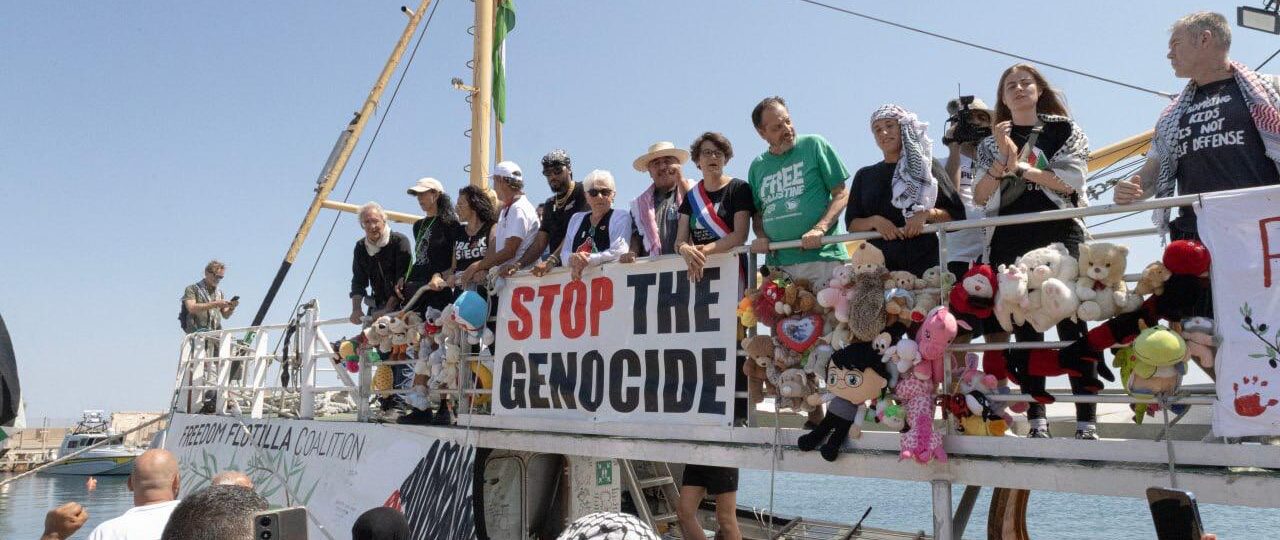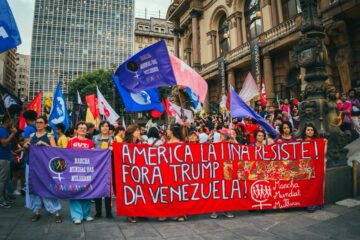Through multiple actions, La Via Campesina (LVC) reaffirms its unwavering solidarity with Palestinian farmers and the broader struggle for the liberation of Palestine, and recognize that this struggle is closely tied to the fight for food sovereignty, the rights of peasants, and the collective right of people to determine their own food systems. LVC denounces that starvation and the destruction of all forms of food production and distribution has been a systematic weapon of the Israeli occupation and genocide. According to them, “hear testimonies reveals how preventing seed access, destroying water infrastructure, and persecuting fishers and farmers are integral components of this strategy.”
Representing more than 200 million peasants that form the organization around the world, two members of LVC are in the Handala Boat, the current peaceful solidarity mission organized by the Freedom Flotilla Coalition. Hatem Aouina from Tunisia, a member of Million Rural Women and the Landless, and the regional representative of La Via Campesina in the Arab and North Africa Region (ArNa) have “embodied the grassroots solidarity of peasant movements with the people of Palestine, who are currently enduring unprecedented levels of violence, siege, and hunger”, as declared by LVC. As the boat keep being attacked and assaulted, all eyes keep moving towards Gaza, and the denounce of the blockade that affects more than 2 million Palestinians.
In the effort to keep condemning the destruction of Gaza, and it’s life systems, and share information and experiences of solidarity from around the globe, the organization held the global webinar “All Eyes on Gaza”, on June 26, 2025. This event paid homage to two members of LVC in Gaza who were recently killed by an Israeli airstrike. Morgan Ody, the international coordinator of LVC, stated that the webinar was dedicated “to the memory and to honor all the farmers, especially women farmers in Gaza, who are resisting on an everyday basis by producing the food and by feeding the people.”
Torkia Cheibi, from the Million Rural Women Association in Tunisia, participated in the “Soumoud” land convoy and denounced the violence encountered by the caravan’s activists. The Soumoud, which aimed to bring humanitarian aid to Gaza, suffered several violations. Its people were denied access to food and suffered resistance to setting camps. The convoy was stopped in Libya. Besides violence targeting people on this action, Torkia denounced the amount of misinformation that surrounded their activities and organization. “The convoy’s only objective was to break the siege on the Palestinian people. We want to ensure that any misinformation about the convoy only supports those who normalize partnering with the Israelis. They target symbols of resistance in an attempt to eliminate any form of resistance that could oppose them,” she affirmed.
We wanted to break the silence and the fear that many people feel because, as Arab people, we are facing many issues, such as the normalization of relations between our governments and Zionist government. This convoy was a success for our dignity. This is a form of resistance, using our bodies as weapons to stop the genocide. It was also a response to the actions of the Israeli occupation, not just in Gaza but also in the West Bank, Palestine as a whole, and Iran and Lebanon.
Torkia Cheibi
Layla Jandoubi, also from Million Rural Women, explained: “we had reached the eastern part of Libya, 40 kilometers in, when we found the road blocked. We were surrounded by Libyan security forces and denied passage. We spent four nights in a desert camp and struggled immensely.” Despite so many challenges imposed by Israel, “the Soumoud convoy remains an experience to be built on. We will return, and there will be more convoys to come. We will raise our voice to the people.”
Anuka de Silva, member of LVC in Sri Lanka, explained the historical struggle for Palestine liberation in her country, as local movements denounce the partnerships between the country’s government and Israel: “the Sri Lankan government plays a dual role in the Palestinian-Israeli conflict. It continuously sends laborers to Israel, including construction workers, health workers and agricultural laborers. We are putting huge pressure on the government to stop tourism from Israel because it’s also a huge issue in our Asian countries. They are trying to spread their Zionist ideology around the world,” she denounces.
Elisa Mascetti, from the Rural Italian Association, an organization member of LVC, participated in the international delegation that went to the West Bank last December 2024. She stated that “all peasants from all the world see that the first priority at this moment is to resist on the land, like in Palestine, and on all the other places in which colonialism and capitalism is trying to steal our land, water, food, and food sovereignty.” Morgan supported, saying that broader mobilizations are important to show the connections between the struggle from different movements against the genocide in Palestine and against the military industry in Europe: “we believe that it’s our responsibility as European farmers together with all the European citizens to ensure the immediate suspension of the EU-Israel agreement. The second thing is to stop the sending of weapons to Israel.”
Samba Fatou, a member of the International Coordinating Committee of LVC representing West and Central Africa, remembered how interconnected the conflicts around the world are. She denounced how wars have global impacts, especially for women and farmers: “the wars have far-reaching consequences for women in Sub-Saharan Africa, particularly those in rural communities. They are always among the first to suffer when global systems fail. Reduced African input and rise in the price of food mean that women, who are primarily responsible for household nutrition, are forced to make impossible choices. The indirect impact of war on women is not fought with bombs, but with poverty, hunger, and the loss of opportunities.”
Micherline Islanda from Haiti highlighted the need for a global solidarity movement with peasants from across the world: “we, the Haitian people, are in our continuous struggle against imperialism, and standing very clearly for human dignity.” In that sense, the conversation ended with a call for the 3rd Nyéléni Global Forum, that will bring togheter movements from around the globe to discuss food sovereignty and system change. The event will take place in September, in Sri Lanka.
About the Nyéléni Forum, Morgan explained how the goal is to build an alliance that challenges the system of domination which is responsible for the conflicts we are currently facing: “we need to make an effort to build these strong alliances with environmental organizations, with feminist movements, with Indigenous peoples from all over the world. This internationalism that we are building between social movements can be what change the world for the better, what takes us out of these very heavy crisis”.




